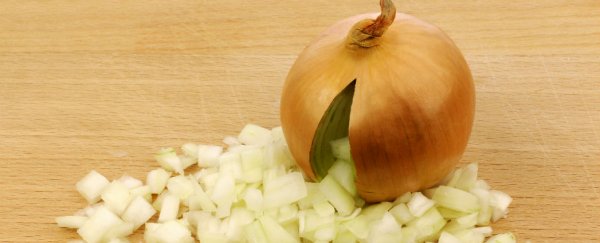Japanese food manufacturing company, House Foods Group, has announced the development of a new tearless onion that's less pungent, so no more odour on your hands or breath.
According to the Agence France-Presse, the team figured out how to neutralise the onion by halting the production of an enzyme that's released when the onion is cut by zapping it with irradiating ions. By disabling the reactive properties of this enzyme, the scientists have managed to stop a chemical reaction that both causes tears and produces thiosulphinate - a substance responsible for the onion's strong smell.
The team has been perfecting their tearless onion for over a decade, the biggest challenge of which has been figuring out the tear-inducing culprit. As Scicurious explains over at Scientific American, scientists had assumed for many years that the chemical Propanethial-s-oxide was responsible for the tears. "Scientists knew that an enzyme called alliinase breaks down the chemical PRENCSO to pyruvic acid. They thought that it just spontaneously went from there to the tear-jerking Propanethial-s-oxide," she says.
But the Japanese team suspected something else was at play, because garlic also contains alliinase, and it's decidedly tear-free. "They added alliinase specifically to PRENCSO… and got NO Propanethial-s-oxide," writes Scicurious. "So the alliinase alone is not responsible for the breakdown. There's another, missing enzyme."
Turns out the culprit is lachrymatory factor (LF) synthase, a powerful enzyme found in onions but not their milder garlic cousins. The team won the 2013 Ig Nobel for Chemistry for their discovery. They say they can now disable the enzyme while retaining the flavour of the onion.
So we've now got a vegetable that would do great in our kitchens, but terribly in nature, as chemist, Eric Block, explains at NPR:
"They are often compounds that will repel insects or animals that try to bite into it. So everything is, I believe, very Darwinian from the standpoint of the chemistry of plants, a very large number of compounds that we view as either being pleasant smelling or unpleasant smelling.
They're not there for our pleasure. They're there to allow the plant to survive in a very hardscrabble world, a world where there are lots of worms in the ground and animals that would devour something that exists as a bulb and has to survive in the ground. So if you're living in the ground as a perennial, as the garlic does, you need to defend yourself, and you can't run. Plants can't run. So they stay and fight, and they're wonderful at it."
Don't worry, little defanged onion. Come inside, we'll take real good care of you…
Unfortunately, the team has yet to announce any plans to commercialise their onion, but we're remaining cautiously optimistic. House Foods Group has promised "more smiles", and we should all hold them to that.
Sources: Yahoo News, NPR, Scientific American
